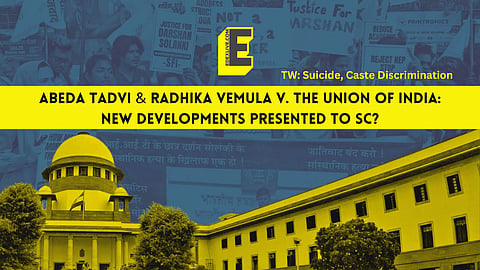

In September 2019, the Supreme Court of India directed the Central Government to respond to a Public Interest Litigation (PIL) on ending caste discrimination in Higher Education Institutes, filed by Radhika Vemula, the mother of the late University of Hyderabad (UoH) PhD scholar Rohit Vemula, and Abeda Tadvi, the mother of the late Dr Payal Tadvi. Four years later, Supreme Court advocate Disha Wadekar has submitted new reports of various forms of caste discrimination against marginalised students in universities for the apex court’s consideration.
The reports were submitted in the form of an additional affidavit on May 31, and include the recent cases of Scheduled Caste and Scheduled Tribe students driven to suicide, notably that of Darshan Solanki at the Indian Institute of Technology, Bombay (IIT Bombay).
The affidavit also includes surveys and verbal anecdotes from students pointing to casteist discrimination against SC and ST students on campuses. Disha Wadekar, who represented the petitioners of the original PIL, says, “The inclusion of these reports is aimed to assist the Supreme Court understand the nature of caste discrimination on campuses better,” adding that these additions also strengthen the case of the petition.
The surveys in question had been conducted by the SC-ST Cell of IIT Bombay, which was closely analysing the events and circumstances behind Darshan’s suicide, and working to amplify the issues pertaining to caste discrimination at IIT-B.
Also included in the affidavit, were the minutes of an open house session on caste discrimination, organised by the SC-ST Cell on June 29, 2022, that “point to a highly discriminative atmosphere on campus towards students from SC and ST communities.”
The affidavit makes mention of the cases of two Adivasi Students – Surbhi of National Law University, Odisha (NLUO), and Dr Preethi Dharawath of Kakatiya Medical College, Telangana – who died by suicide on April 4, 2022, and February 26, 2023, respectively.
In Surbhi’s case, the affidavit invokes categorical accusations of the lack of “care or empathy from the administration, coupled with abuse, arbitrary decision making, and demonising the students.”
Dr Preeti, who was a first-year student at the Kakatiya Medical College, belonged to the Lambada community. The affidavit stated that she had to face “persistent targeted harassment and deliberate attempts to insult her by her senior”, an aspect of a “pervasive culture” in medical courses. Following her death, the police invoked sections against ragging and those under the SC/ST (Prevention of Atrocities) Act, says the affidavit.
Lack of sensitisation needs to be addressed
Be it in the IITs, the NLUs, or medical colleges, the affidavit makes it apparent that the increasingly frequent cases of student suicides of SC and ST students in higher educational institutions (HEIs) stem from the institutional “physical exclusion, psychological discrimination, and indifference they face” within their structures.
To illustrate this, the affidavit especially mentions how the circumstances that led to Darshan Solanki’s death point to the “general alienation that Scheduled Caste and Scheduled Tribe students face in IITs.”
The affidavit further terms these deaths as “avoidable”, and attributes their occurrence to “a lack of sensitisation towards caste-based discrimination within institutions of higher learning.” Persistent sensitisation for the entire academic community in India, and greater inclusion of the marginalised castes are the only “rational and workable solutions” to put an end to student suicides, the affidavit’s petitioners maintain.
Abeda Tadvi & Radhika Vemula v. The Union of India: A Recap
The cases of Dr Payal Tadvi and Rohit Vemula before her, acted as catalysts for a sharper, more thorough examination of systemic inequalities and institutional casteism on higher educational campuses, while also fostering a new wave of anti-caste advocacy in the country.
In this vein, Radhika Vemula and Abeda Tadvi, represented by senior lawyer Indira Jaisingh, and Disha Wadekar, submitted a joint petition in Public Interest to the Supreme Court of India, on the “rampant prevalence of caste-based discrimination in higher educational institutions throughout the country”, and the “flagrant non-compliance” of to address them.
This discrimination, the PIL said, violates fundamental rights as enshrined in Articles 14, 15, 16, 17 (Right to Equality), Article 15 (Right to Prohibition of Discrimination Against Caste), and Article 21 (Right to Life) of the Indian Constitution.
The PIL questions the University Grants Commission (UGC) on the non-implementation of the UGC Equity Regulations (2012) by HEIs and urges the body to take stringent actions against those that flout these norms.
It then asks the UGC to see to it that every university has established an Equal Opportunity Cell with SC, ST representatives and members of external NGOs, to address complaints against discrimination in an objective and impartial manner. It also asks HEIs to be directed to show their guidelines against caste discrimination and on the implementation of the Equity Guidelines on their websites.
The petitioners also ask HEIs to organise compulsory workshops and training sessions for staff and students, to sensitise them to issues of caste from time to time.
Further, the petition requests both the UGC and the National Assessment & Accreditation Council (NAAC) consider “measures to prevent caste-based discrimination” as a separate criterion in accreditation – and base the accreditation on the implementation of affirmative actions and diversity. This, the petition argues, “incentivises Universities to develop a congenial atmosphere that promotes diversity.”
The PIL also invoked past cases of caste-based discrimination in higher education – namely, the reports of harassment, discrimination, and segregation of lowered caste students in the All India Institute of Medical Sciences, New Delhi in 2008, and the suicide of Senthik Kumar, a PhD Scholar of the University of Hyderabad (UoH) in 2008, where it was observed that UoH was “acting against the interests of the SC, ST students.”
“Since 2004, there have been over 20 documented instances of students committing suicide across the universities in the country,” the petition said.
According to Disha Wadekar, the new affidavit will be heard by the Supreme Court in July, when the court resumes operation.
